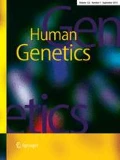Abstract
The autosomal recessive polycystic kidney disease (ARPKD) gene, PKHD1, has been implicated in the genesis or growth of colorectal adenocarcinoma, as a high level of somatic mutations was found in colorectal tumor tissue. To determine whether carriers of a single PKHD1 mutation are at increased risk of colorectal carcinoma, we assessed the prevalence of the commonest European mutation, T36M. First, we assayed a European cohort of ARPKD patients and found T36M was responsible for 13.1% of mutations. We then investigated two European cohorts with colorectal adenocarcinoma versus two control cohorts of similar age and gender. Screening for the most common PKHD1 mutation, T36M, we detected 15:3,603 (0.42%) controls versus 1:3,767 (0.027%) colorectal cancer individuals, indicating that heterozygous PKHD1 mutations are not a risk factor and are protective (p = 0.0002). We also show that the carriage rate for PKHD1 mutations in the European population is higher than previous accepted at 3.2% (1:31 genomes).
References
Bergmann C, Senderek J, Windelen E, Kupper F, Middeldorf I, Schneider F, Dornia C, Rudnik-Schoneborn S, Konrad M, Schmitt CP, Seeman T, Neuhaus TJ, Vester U, Kirfel J, Buttner R, Zerres K (2005) Clinical consequences of PKHD1 mutations in 164 patients with autosomal-recessive polycystic kidney disease (ARPKD). Kidney Int 67:829–848
Chng WJ (2007) Limits to the human cancer genome project? Science 315:762 (author reply 764–5)
Consugar MB, Anderson SA, Rossetti S, Pankratz VS, Ward CJ, Torra R, Coto E, El-Youssef M, Kantarci S, Utsch B, Hildebrandt F, Sweeney WE, Avner ED, Torres VE, Cunningham JM, Harris PC (2005) Haplotype analysis improves molecular diagnostics of autosomal recessive polycystic kidney disease. Am J Kidney Dis 45:77–87
Forrest WF, Cavet G (2007) Comment on “The consensus coding sequences of human breast and colorectal cancers”. Science 317:1500 (author reply 1500)
Getz G, Hofling H, Mesirov JP, Golub TR, Meyerson M, Tibshirani R, Lander ES (2007) Comment on “The consensus coding sequences of human breast and colorectal cancers”. Science 317:1500
Loeb LA, Bielas JH (2007) Limits to the human cancer genome project? Science 315:762 (author reply 764–5)
McWilliams RR, Rabe KG, Olswold C, De Andrade M, Petersen GM (2005) Risk of malignancy in first-degree relatives of patients with pancreatic carcinoma. Cancer 104:388–394
Newcomb PA, Baron J, Cotterchio M, Gallinger S, Grove J, Haile R, Hall D, Hopper JL, Jass J, Le Marchand L, Limburg P, Lindor N, Potter JD, Templeton AS, Thibodeau S, Seminara D; Colon Cancer Family Registry (2007) Colon Cancer Family Registry: an international resource for studies of the genetic epidemiology of colon cancer. Cancer Epidemiol Biomarkers Prev 16(11):2331–2343
Rossetti S, Torra R, Coto E, Consugar M, Kubly V, Malaga S, Navarro M, El-Youssef M, Torres VE, Harris PC (2003) A complete mutation screen of PKHD1 in autosomal-recessive polycystic kidney disease (ARPKD) pedigrees. Kidney Int 64:391–403
Rubin AF, Green P (2007) Comment on “The consensus coding sequences of human breast and colorectal cancers”. Science 317:1500
Sjoblom T, Jones S, Wood LD, Parsons DW, Lin J, Barber TD, Mandelker D, Leary RJ, Ptak J, Silliman N, Szabo S, Buckhaults P, Farrell C, Meeh P, Markowitz SD, Willis J, Dawson D, Willson JK, Gazdar AF, Hartigan J, Wu L, Liu C, Parmigiani G, Park BH, Bachman KE, Papadopoulos N, Vogelstein B, Kinzler KW, Velculescu VE (2006) The consensus coding sequences of human breast and colorectal cancers. Science 314:268–274
Ward CJ, Hogan MC, Rossetti S, Walker D, Sneddon T, Wang X, Kubly V, Cunningham JM, Bacallao R, Ishibashi M, Milliner DS, Torres VE, Harris PC (2002) The gene mutated in autosomal recessive polycystic kidney disease encodes a large, receptor-like protein. Nat Genet 30:259–269
Weaver BA, Silk AD, Montagna C, Verdier-Pinard P, Cleveland DW (2007) Aneuploidy acts both oncogenically and as a tumor suppressor. Cancer Cell 11:25–36
Zerres K, Volpel M-C, Wei B (1984) Cystic kidneys. Hum Genet 68:104–135
Zhang J, Wu M, Wang S, Shah J, Wilson PD, Zhou J (2010) Polycystic kidney disease protein fibrocystin localizes to the mitotic spindle and regulates spindle bipolarity. Hum Mol Genet 19:3306–3319
Acknowledgments
Funding for the TaqMan assay was provided by the Division of Nephrology and Hypertension, Mayo Clinic, Rochester, MN, Research Committee and the PKD Foundation. This work was supported by the Clinical Core of the Mayo Clinic Center for Cell Signaling in Gastroenterology (P30DK084567); Mayo Clinic SPORE in Pancreatic Cancer (P50 CA102701); the Lustgarten Foundation for Pancreatic Cancer Research and National Institutes of Health R01 grants DK59597 and DK065056. This work was supported by the National Cancer Institute, National Institutes of Health under RFA # CA-95-011 and through cooperative agreements with members of the Colon Cancer Family Registry and P.I.s. Collaborating centers include “Australasian Colorectal Cancer Family Registry (U01 CA097735)”, “Familial Colorectal Neoplasia Collaborative Group (U01 CA074799)”, [USC] “Mayo Clinic Cooperative Family Registry for Colon Cancer Studies (U01 CA074800)”, “Ontario Registry for Studies of Familial Colorectal Cancer (U01 CA074783)”, “Seattle Colorectal Cancer Family Registry (U01 CA074794)”, “University of Hawaii Colorectal Cancer Family Registry (U01 CA074806)”, “University of California, Irvine Informatics Center (U01 CA078296)”.
Conflict of interest
The authors state that they have no competing financial interests.
Author information
Authors and Affiliations
Corresponding author
Additional information
The content of this manuscript does not necessarily reflect the views or policies of the National Cancer Institute or any of the collaborating centers in the CFRs, nor does mention of trade names, commercial products, or organizations imply endorsement by the US Government or the CFR.
Rights and permissions
About this article
Cite this article
Ward, C.J., Wu, Y., Johnson, R.A. et al. Germline PKHD1 mutations are protective against colorectal cancer. Hum Genet 129, 345–349 (2011). https://doi.org/10.1007/s00439-011-0950-8
Received:
Accepted:
Published:
Issue Date:
DOI: https://doi.org/10.1007/s00439-011-0950-8

